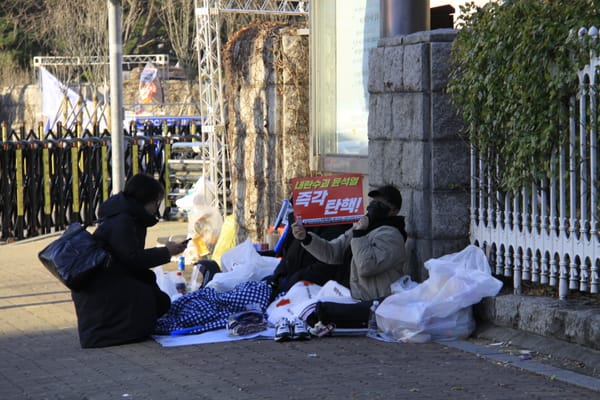Asia Undercovered Round-up: 18 April 2023
This week: A China human rights update, Malaysia's new unity government, and investigating deforestation and its links to Uyghur forced labor.
Undercovered last week
China human rights update: Another Muslim community in China, the Hui, has gotten far less attention Tibet and the Uyghurs, but their unique culture and religious identity are also facing similar threats, says this report from CHRD. A reminder that repression, if unaddressed, always spreads.
Meanwhile, in Tibet, the sister of a falsely imprisoned businessman, who has been appealing his sentence, was arrested, beaten and tortured, according to this report in RFA.
And in Hong Kong, the government finally allowed a small protest – against a development project. It was heavily policed, with participants forced to wear numbered badges and no one allowed to join without prior permission. This is the new reality under the draconian National Security Law (Hillary Leung, Hong Kong Free Press).
Is India still a democracy? The leader of the main opposition Congress party, Rahul Gandhi, was booted from his seat and disqualified from running on charges of defamation, in what many see as a clear step towards BJP authoritarian rule (Shaun Tavitiki, Madras Courier).
It’s now been two years since the horrific coup that overthrew Myanmar’s democratic government. Increasingly, says Naw Theresa, the situation is spiraling towards all-out civil war, with both sides entrenched and no space for peaceful negotiation remaining (The Diplomat).
In Indonesia, authorities have arrested an anti-mining activist, Robison Saul, in what HRW considers a politically motivated conviction. He had played a role in protests and roadblocks organized by villagers on Sangihe Island against the gold mining company PT Tambang Mas Sangihe.
Worth reading: This piece by Filip Noubel for Global Voices interviews Mongolian LGBTQ+ activists, illuminating the challenges they face in the conservative country, and why, for many, exile is often seen as the “best solution.”

Electoral Politics
Malaysia’s election got almost no attention in global media, and the new administration is, also, getting nearly no coverage. So this week, highlighting two articles on this.
The first one provides a regional lens to an issue gaining global attention - #TikTok. According to Nuurrianti Jalli, the video app was a breeding ground for hate speech during the election, and notes the “insufficient enforcement” by the platform (The Conversation).
Zurairi A.R. has a great write-up on the early returns from the Anwar “unity” administration for Malay Mail, including its efforts to address rising living costs, improve public transportation, along with worrying pandering to the Islamist right.

Geopolitics
For the most part, the response by western nations, and many Southeast Asians ones too, is to shun the Myanmar junta and push for negotiations and dialog. But one country has taken a different approach – China – who is cozying up ruling General Min Aung Hlaing, argues Bertil Lintner in this informative, in-depth piece for Global Asia.

Solutions Stories
From Kontinentalist, another wonderful data-drive visual story by Mariyam Haider, this one focusing on issues facing women and the lack of safe spaces. It starts with one community in Lyari, Pakistan, which has created leisure spaces for women to build mutual support and aid through an innovative cafe – and how others are doing the same across Asia.
In South Korea, the Baekje Kingdom was one of the earlier in the country, and the ruins now form one of the country’s most picturesque cultural heritage sites. But it remains off-the-beaten path, and the region is experiencing populations loss. A new approach aims to both rejuvenate the tourism sector by engaging community members to support bike-sharing, homestays, and more, through the use of technology (Jihon Kim).

What I wrote
This piece published last week in Al Jazeera was probably the most difficult article I've ever worked out - supported by a Pulitzer Center grant, and took 5-6 months of reporting, a lot of interviews, data research and fact-checking.

It links human rights abuses in both Indonesia and China, including Uyghur forced labor, to Sumatran deforestation, and global garment supply chains. Field reporting, photos, and local interviews were done by Tonggo Simangunsong, from North Sumatra, while I focused on China and global interviews.

Asia Undercovered: Round-ups and in-depth analysis of the news, events, trends and people changing Asia, but not getting enough attention in the US media.



